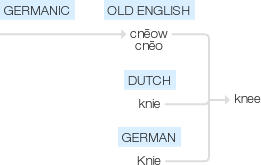Knee
Old English cnēow, cnēo, of Germanic origin; related to Dutch knie and German Knie, from an Indo-European root shared by Latin genu and Greek gonu .
wiktionary
From Middle English kne, from Old English cnēow, from Proto-West Germanic *kneu, from Proto-Germanic *knewą (compare Low German Knee, Dutch knie, German Knie, Danish knæ, Norwegian kne, Swedish knä), from Proto-Indo-European*ǵnéw-o-m, a thematic derivative of *ǵónu. Cognate with Hittite 𒄀𒉡(genu), Latin genū, Tocharian A kanweṃ(dual), Tocharian B kenī, Ancient Greek γόνυ(gónu, “knee”), γωνία(gōnía, “corner, angle”), Old Armenian ծունր(cunr), Avestan 𐬲𐬥𐬎𐬨 (žnum), Sanskrit जानु(jā́nu).
The obsolete plural kneen is from Middle English kneen, knen, kneon, kneuwene.
etymonline
knee (n.)
"joint between the principal bones of the leg," Old English cneo, cneow "knee," from Proto-Germanic *knewa- (source also of Old Norse kne, Old Saxon kneo, Old Frisian kni, Middle Dutch cnie, Dutch knie, Old High German kniu, German Knie, Gothic kniu), from PIE root *genu- (1) "knee; angle." For pronunciation, see kn-.
To be across (someone's) knee in reference to spanking is from 1866. Knee-breeches is from 1827; knee-pants is from 1858. Knee-slapper "funny joke" is from 1955.
knee (v.)
early 13c., "to bend the knee, kneel," from Old English cneowian, from cneow (see knee (n.)). The meaning "to strike with the knee" is first recorded 1892. Related: Kneed; kneeing.
